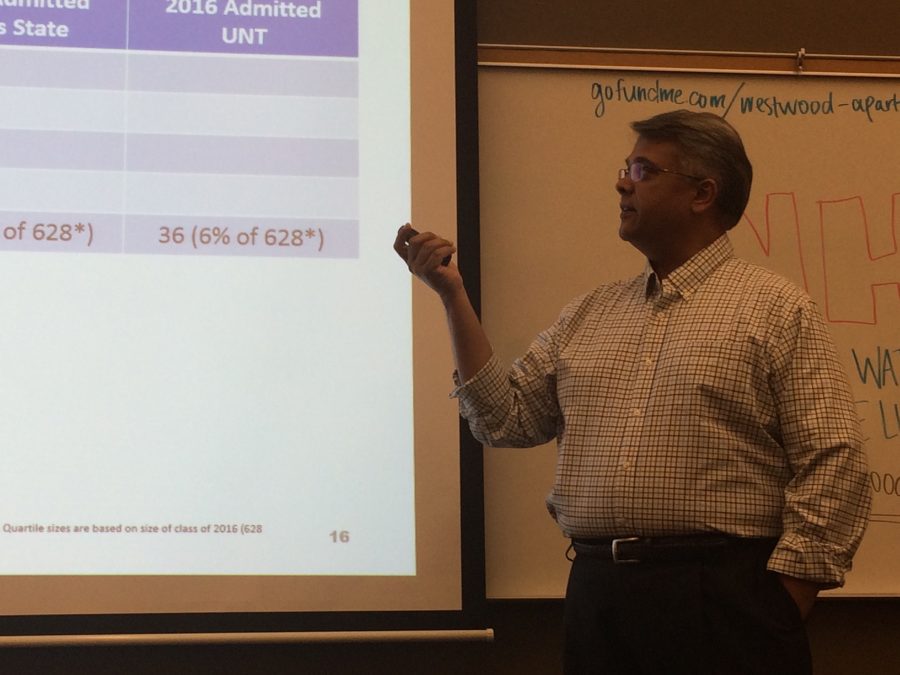Parent-led Grassroots Movement Debates Rank In Class
Mr. Hiten Patel presents data supporting the elimination of Rank In Class.
Coming together for the first meeting of a grassroots movement to abolish the Rank in Class (RIC) system, parents gathered in the Great Room on Wednesday, April 5 at 7 p.m. This informational meeting, organized by concerned parents, is the first of a series of discussions about the negative aspects of the RIC system. Through these gatherings, the parents hope to develop a proposal to present to the Round Rock ISD Board of Trustees in late May.
The RIC system evaluates each student in comparison to his/her peers, and dates back to 1997, when Texas passed the “Top 10 Percent Rule” guaranteeing top-ranked students automatic admission to all state-funded universities. In 2010, Round Rock ISD decided to continue the RIC policy and reevaluate it in several years time, but in 2016, it decided that changing RIC was not a priority. Due to rising stress levels reported in Westwood climate surveys, however, parents once again have decided to challenge RIC.
“We started this process to say, ‘This may not be important to them, but it is important to us,’” Mr. Hiten Patel said. “When you look at this issue of Rank in Class, it’s one of those systematic changes that has to happen. We might do lot of other things at this school to help students with stress and anxiety, but ultimately, if you don’t change the environment that you’re in, it’s going to continue to perpetuate.”
During the meeting, Mr. Patel presented data proving the high stress levels students experience. In climate surveys, the percentage of students, teachers, and parents reporting high levels of student anxiety steadily increased in recent years. In addition, Mr. Patel revealed that 94 percent of students don’t get the 8-10 hours of sleep recommended for teenagers by the National Institute of Mental Health. He also presented anecdotal evidence that stress induced by rank resulted in unhealthy competition and acted as a barrier to social connection.
“We’ve created a pond for our children and we’ve been turning up the heat dial,” Mr. Patel said. “Our children will stay in that pond, because that’s what frogs do, but they’re burning up. We have to change Rank in Class to reduce the temperature of the water.”
As part of the proposed plan to replace RIC, only the 7 percent and quartile percentile thresholds would appear on students’ transcripts, not their ranks. Students would learn their GPA after freshman year and be informed of their placement within the thresholds in the second semester of sophomore year. In addition, Latin honors such as summa cum laude, magna cum laude, and cum laude, would be based on GPA rather than class rank. To further relieve stress due to overwork, course descriptions would be revised to be more descriptive, and parent-student counseling would be required if a student exceeds a certain number of advanced classes. Parents are still in the process of deciding how to transition in the plan if it is passed — through phase-in, where it would apply to rising freshmen, opt-in, or making it effective immediately.
“From what I’ve understood from talking to parents and kids at other schools who do not have class rank, it has been nothing but a positive,” Ms. Sara Solomon, another organizer of the meeting, said. “[Eliminating] it gives more of a purpose of learning out of curiosity and not playing the game of ‘What classes can I take to raise my GPA?’”
Despite the meeting organizers’ confidence, many parents presented concerns that removing RIC would disadvantage students for college admission. Others voiced the opinion that removing RIC would add anxiety because students wouldn’t know how they stood in their percentile brackets. Additionally, the RIC system still stands in place today because it encourages hard work, honors academic achievement, and shows what life is like after high school. Mr. Patel’s presentation addressed these arguments by affirming that stress and academic dishonesty caused by RIC outweighs the advantages of the system.
“In the corporate world that I live in, every year, GE fires the bottom 10 percent,” Mr. Patel said. “Life has ranking, life has ramifications for not meeting whatever that bar is. In this particular aspect, I don’t know if life has to start in high school for our kids.”
Mr. Patel countered these arguments with data suggesting that class rank has diminished in importance for college admissions over the years. For applicants without a class rank, colleges impute a hypothetical rank based on GPA, which typically errs in the student’s advantage. In Westlake, for example, eliminating RIC caused UT acceptance rates to increase. Mr. Patel argued that an end to the RIC system would benefit all students.
“In my mind, this is not a zero-sum game,” Mr. Patel said. “What benefits me doesn’t have to hurt you in this question. For those students where rank is important to them, they will still know where they stand. We just won’t make it an everyday part of the life that students have to live.”
Movement leaders urged parents to take action by signing a petition and following updates on social media and email. The parents will also reach out to students and faculty for support to abolish RIC.
“This is a parent driven movement, but what I can say is I appreciate the effort and care this community has for our students,” Principal Mario Acosta said. “If we need student voice on this, I can help make sure that our students have voice on this. This is really about what the community wants. Whatever you think is best is where we’ll go and I’ll be with you. We’ll go full speed and we’ll make our school the best school we can be.”

Aside from being a student, I dance and play piano. I’m invested in the arts, but also enjoy science, math, and logic. In my free time, I also obsessively...


Hiten Patel • Apr 9, 2017 at 1:00 pm
Thank you for covering this event. I think it is a very important conversation for our Community to have. A couple of things: first, while parents have taken the lead in bringing this issue to the public square, this is very much a student issue. You live with the good and bad of RIC, so we’d love to hear from you directly. I urge you to speak to your parents, teachers, counselors and Mr. Acosta so they know where you stand on this issue, and to also lend your voice directly if you feel strongly one way or another. Second, a minor correction — the data that I used for the sleep hours comes from the National Institutes of Mental Health in comparison with the self-reported number of hours of sleep from the 2016 Campus Climate Survey for WHS. Your source may also say the same thing, but I wanted you to know where I got my data from.
Amy Vo • Apr 13, 2017 at 9:47 am
Thank you for providing the clarification. We have made the correction.